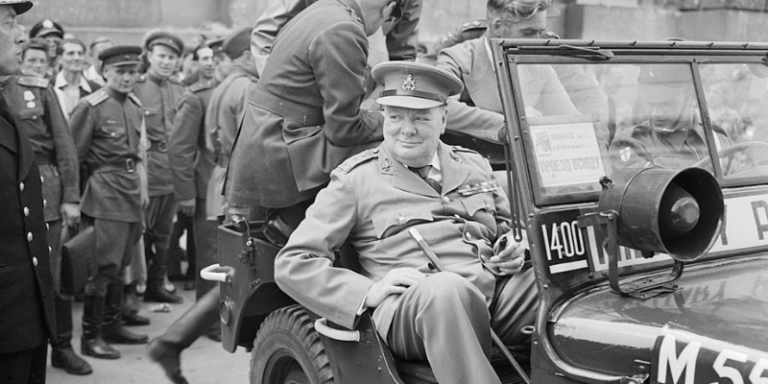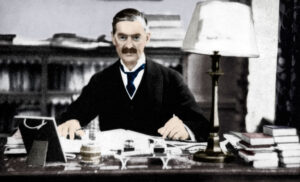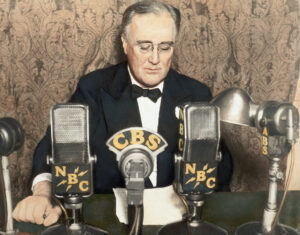Churchill Vs. Hitler: Standing Up for Europe
World War Two presents the textbook schoolyard bully scenario.
By: Pennel Bird | August 20, 2020 | 1044 Words

Winston Churchill ,1945 (Photo by Capt. W T Lockeyear Imperial War Museums via Getty Images)
During the years leading up to the most terrible conflict in history, one man stood alone. He warned of the sinister approach of an evil so absolute it would black out the stars. This darkness would gain size and shape, he cautioned, as it rolled in like thunderclouds. The force behind this impending horror was a ruthless, ambitious Austrian statesman named Adolf Hitler.
And the great man who faced down the Nazi leader was Winston Churchill. His brave and steadfast actions reach across the century to remind us to stand up when faced with the cruelty of bullying on any scale.
But Churchill’s dire words of warning fell on deaf ears in the British Parliament in the first years of the 1930s, as Hitler came to power. Winston was thought of as an anachronism at the time – a warmonger whose moment had long since passed. For this reason, his fervent appeals to move against Hitler were considered alarmist. No one paid much attention to the fact that this extremist’s shocking manifesto, Mein Kampf, was galvanizing Germany – but Churchill did.
Complicating all this was the fact that England was still heartsick at the losses it had suffered in World War 1 when nearly one million of its countrymen perished. There was no appetite for war among the British people. And their genial Prime Minister Neville Chamberlain reflected this reluctance. But times were changing quickly.
Hitler – Bullying Europe
Germany had been humiliated in defeat in World War 1. The Treaty of Versailles imposed harsh measures on the vanquished. The insult to the character of the proud German people was total – and the desire to ultimately reassert German will, was palpable.
Hitler knew this. He sought to harness the simmering discontents and did so with powerful speeches against all those he deemed insufficiently Teutonic – including the Jewish.

Neville Chamberlain (Photo by The Print Collector/Getty Images)
So Hitler gained power until his Nazi party held absolute political and military rule throughout the land. After this, he indulged an expansionist bent designed to increase what was known as “lebensraum” or living space for the German people. In reality, his real vision was to create a German empire based on sheer power and military might. In 1938 Hitler made good on his many promises and annexed the Sudetenland.
Churchill was right – he’d been right all along. Hitler then took over Czechoslovakia after he’d promised not to, followed by a full-scale invasion of Poland in 1939. Prime Minister Neville Chamberlain met with Hitler three times during this period without any effort to critique his obvious designs on power. In fact, Chamberlain agreed to Hitler’s take-over of the Sudetenland.
This yielding to open aggression was known as “appeasement.” By crossing his fingers and putting his head in the sand, the well-meaning Chamberlain only encouraged Hitler’s aggression. It also doomed his country and all of Europe to the horrors of the Third Reich’s iron fist.
Despite Chamberlain’s claims he had delivered “peace in our time,” by yielding to Hitler, by 1940 the “Fuhrer” had invaded Belgium, Luxembourg, the Netherlands and France – and Churchill’s moment had come ‘round at last. Chamberlain stepped down. The stage was set for a battle of the ages as Churchill became prime minister.
The Nazi shadow fell across Europe with little resistance until Churchill told the British people to “never surrender.” The little island would take a stand. But the struggle against evil was years long and fraught with terrors, hardships, and death. These included the power of Hitler’s “blitzkrieg” (lightning-fast attacks) and a bombing campaign on London that went on nightly for months.
Eventually, Hitler was defeated because he miscalculated and over-reached – but mainly because his aggressions were met with stiff resistance from the Allies: Britain, Russia, France, and the United States. Churchill’s leadership made this possible. He drew America into the war by meeting with President Roosevelt – a partial agreement that became total after the attack on Pearl Harbor by the Japanese.
Churchill’s radio addresses asking the British people to draw on their innate strength were instrumental in helping them rise up and push back.
What Can WW2 Teach Us Today?

President Franklin D. Roosevelt (via Getty Images)
There is much to be learned from this harrowing moment in history. Many of us are either subject to or witness to bullying. The bully seeks to intimidate, threatening violence to those who don’t comply. Think of the mean kid who takes lunch money from his peers.
The victim seeks to end the incident as soon as possible. However, giving in seldom ends bullying, but rather, encourages it. Bullies seek weakness as a way to demonstrate their “strength.” Think of Chamberlain agreeing to allow Hitler to annex the Sudetenland. Now think of a bully’s demand to hand over the ball – now. If the bully gets the ball without resistance, he is very likely to do the same thing again – but next time demand a bike. The fall of Poland leads to the capture of France.
There are many ways to fight back against a bully. A loud, stern “No!” is a good start. Walking away to resist another day can sometimes defuse the situation – a person can lose the battle to win the war later. Telling others, including adults, and asking for help can be a good idea – just as Churchill did when he reached out to President Roosevelt.
And helping someone else to confront bullying fulfills the golden rule of doing unto others as you would have them do unto you. Would you wish someone to flank you as you faced the school bully – like the Allies did for England in WW2 against the Nazis? Stand up for the oppressed and maybe they’ll return the favor in your moment of crisis.
They say that those who forget history are doomed to repeat it. The lessons learned in WW2 apply to schoolyards everywhere and to life itself. When faced with intimidation and the threat of violence in this world, it is not easy to be Chamberlain or Churchill. But only one man’s lessons ring clear as a bell across the century.
















